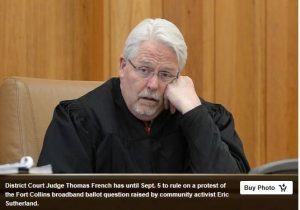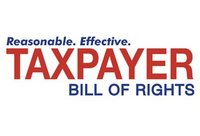
Judge to decide Fort Collins broadband ballot wording issue

The fate of a November ballot question that could lead to Fort Collins providing high-speed internet services is in the hands of Larimer County District Court judge.
Fort Collins resident Eric Sutherland and attorneys representing the city squared off in court Friday morning to argue about whether the content and form of the broadband ballot question meet legal requirements.
District Court Judge Thomas French has until Tuesday to decide whether to change the ballot language approved by City Council or let it stand.
The city’s deadline for certifying the ballot language to the Larimer County Clerk’s Office is Sept. 8. The county is coordinating the Nov. 7 election.
Sutherland raised five complaints about the ballot language, ranging from the lack of a comma, which he said made the question grammatically incorrect, to whether it complies with the Taxpayers’ Bill of Rights, or TABOR, amendment to the state constitution.
If approved, the measure would amend the City Charter to allow but not require the City Council to establish a telecommunications utility. The utility would be a standalone entity or part of the city’s Light and Power Utility.
El Paso County initiative could jumpstart local funding for I-25
It’s your money.
TABOR allows you a vote to let the government keep it or if you would rather have it in your pocket.
El Paso County TABOR initiative could jumpstart local funding for I-25 widening
Posted: Aug 29, 2017 8:42 PM EDTUpdated: Aug 29, 2017 8:43 PM EDT
TABOR Committee featured at national ALEC conference in Denver
TABOR Committee featured at national ALEC conference in Denver
Colorado’s Taxpayer’s Bill of Rights (TABOR) was in demand at the 44th Annual American Legislative Exchange Council (ALEC) meeting held at the Hyatt Convention Center in Denver at the end of July. The TABOR Committee board of directors and friends presented the case (in a three hour workshop session) showing other states how to adopt measures similar to TABOR. TABOR Committee Chairman Penn Pfiffner also addressed approximately 60 legislators and staff at a special session on July 28th concerning the importance of TABOR-like efforts in their own states.
TABOR is a Colorado constitution protection (approved by the voters of Colorado in 1992) that restrains tax increases to not greater than the sum of population growth and the rate of inflation without a vote of the people. It is the gold standard for all 50 states regarding sound fiscal responsibility. It protects the citizen’s right to be heard on tax increases that otherwise would not be subject to voter approval. It was because of TABOR that Colorado voters had the opportunity to recently reject two very large tax increases in Colorado. Amendment 66, a $1 billion tax increase proposal in 2013, and Amendment 69, a $25 billion tax increase proposal in 2016, were both soundly defeated at the ballot box by more than 60% of Colorado voters. TABOR made those votes possible.
The American Legislative Exchange Council is a nonprofit organization of conservative state legislators and private sector representatives who draft and share model state-level legislation for distribution among state governments in the United States. ALEC provides a forum for state legislators and private sector members to collaborate on model bills—draft legislation that members may customize and introduce for debate in their own state legislatures. The ALEC annual meeting included keynote presentations by former US Speaker Newt Gingrich, Education Secretary Betsy DeVos, Colorado Congressman Ken Buck, Kentucky Governor Matthew Bevin, and other national leaders.
Please visit www.thetaborfoundation.org to learn more about TABOR and how you can help protect Colorado voter’s right to be heard.

Colorado Court Grants Taxpayers’ Motion as to Healthcare Tax
Colorado Court Grants Taxpayers’ Motion as to Healthcare Tax

Progressive commissioner group seeks to “untangle TABOR” & redirect Senate Bill 267 money
DENVER – Transportation funding in Senate Bill 17-267, that was billed as the “Sustainability of Rural Colorado” Act, may in fact filter to more-populated areas if a newly-formed association made up of like-minded county commissioners has anything to say about it.
SB 267 was rushed through with more than 70 pages of strike below in the waning moments of the 2017 legislative session. It was billed as the “Grand Deal” by its supporters and the “Grand Betrayal” by its detractors.
There is no doubt it was controversial throughout the process because it involved reclassifying the Hospital Provider Fee from a Taxpayer’s Bill of Rights (TABOR) governed account to an enterprise, non-TABOR restricted account. It also put into use Certificates of Participation (COPs), which some believe are an end around TABOR. Some also believed it violated Colorado’s single-subject law for new legislation.
Since it was signed into law and took effect July 1, Complete Colorado broke the news that a drafting error would cost special taxing districts such as the Regional Transportation District (RTD) and the Scientific and Cultural Facilities District (SCFD), which funds the Denver Zoo and the Denver Museum of Nature and Science, millions in revenue.
Complete Colorado has also learned that an organized group of county commissioners called Counties and Communities Acting Together (CCAT) see the new law as a stepping stone to further weaken TABOR.
In Groundbreaking Decision, DC Court Orders IRS to Return Money to Victims
Is it a “tax” or “fee”?
You be the judge.
The Court held that the IRS could not charge “fees” for a thing with no value to the “tax”payer.
In Groundbreaking Decision, DC Court Orders IRS to Return Money to Victims
The judicial branch exists primarily to ensure that Constitutional principles are properly upheld by the courts. And yet, constitutional victories have been troublingly rare as of late. But even though limited government and a true separation of powers seems almost non-existent, the United States District Court for the District of Columbia just handed down a precedent-setting decision that is a win for anyone who supports constitutional limits to state power.
In the class action suit of Steele v. United States, the Court ruled that the IRS would be required to return an estimated $270 million in “user fees” charged to Americans in what a U.S. District Court determined was an unlawful expansion of the agency’s authority.
The Court ruled that occupational licensing was outside the IRS’ scope of authority.
In 2010, the Treasury Department and the IRS issued a tangle of new regulations, including a requirement that tax preparers register for a specific ID number (PTIN) to be entered on all returns. For anyone who had previously been preparing tax returns for others without a state-sanctioned “professional” preparer’s status, this new regulation required them to pass a competency exam before receiving the required PTIN.
Healthcare “Enterprise” is Unconstitutional, says Taxpayer Group
| FOR IMMEDIATE RELEASE
Contact: William Perry Pendley, 303/292-2021, Ext. 30 Healthcare “Enterprise” is Unconstitutional, says Taxpayer Group June 30, 2017 – DENVER, CO. A Colorado group that defends the rights of taxpayers today filed a motion to amend and supplement its complaint against two Colorado entities and their officials for violation of the Colorado Constitution’s Taxpayer’s Bill of Rights (TABOR). On June 26, 2015, the TABOR Foundation alleges in Denver County Court that its members should have been allowed to vote on whether a “hospital provider fee” could be imposed on Colorado hospitals, which since its enactment in 2009, allowed Colorado’s Department of Health Care Policy and Financing to collect tens of millions and perhaps even a hundred million dollars. Although federal law lets States impose healthcare assessments to pay for Medicaid services, the regulations provide for “taxes” and not “fees” as Colorado calls them to avoid TABOR. Also, although the 2009 act provided that the funds collected would be kept separate from the general fund, in fiscal years 2010, 2011, 2012, and 2013 some of the tax proceeds were put in the general fund. The Foundation sought declaratory and injunctive relief and refund of revenues collected, with the payment of interest, as required by TABOR. As of October 16, 2015, a motion by the Colorado defendants to dismiss the lawsuit had been briefed fully. On May 30, 2017, Governor Hickenlooper signed into law S.B. 17-267, which created the Colorado Healthcare Affordability and Sustainability Enterprise to administer the Hospital Provider Charge beginning on July 1, 2017; however, except for the insertion of the Enterprise in this purportedly unconstitutional endeavor, all of the Foundation’s 2015 claims for relief remain virtually identical. |
Guest editorial: Provider fee bait and switch evades TABOR
June 22, 2017 9:58 AM· By Brian Vande Krol
Little ole Colorado, you’ve done well for yourself. You were a collection of cow towns when I first moved here in 1988. It was said that yogurt was the only culture in Colorado, and cowboys don’t eat yogurt.
Colorado is wealthy. Not DC wealthy, but quite a step up from the late 80’s. We rank 11th for median household income, have the 10th lowest unemployment rate, and the 14th lowest poverty rate. We have the Denver Performing Arts Center, and a growing system of subsidized trains. Colorado is also healthy, ranking 10th.
One reason we have done well is our restrained state government. With our balanced budget requirement and the Taxpayer’s Bill of Rights (TABOR), government has a tough time taking more of our money. That means greater economic growth.
But 70% of our state’s roads and bridges are in poor or mediocre condition, and getting worse. And, despite all that wealth and health, 1 in 4 Coloradans depend on the government for healthcare (Medicaid). The legislature wants more of your money, and is willing to close down hospitals to keep it.
The most cynical move of all
The legislature argued for several years about the Hospital Provider Fee, an $800 million program, claiming it is solely responsible for exceeding TABOR revenue limits, a situation that would require refunds to taxpayers. (Yes, it’s actually a tax. They just call it a fee so they don’t have to ask per![]() mission to take the money.) But every revenue source is equally to blame for exceeding the limit. To appease their insatiable appetite for more revenue, the legislature moved the program out of the general fund so it is not subject to the revenue limits. This is a crafty, deceptive scheme to avoid asking permission from voters to take more money, and to avoid refunding excess collections. They threatened to close rural hospitals if they didn’t get their way.
mission to take the money.) But every revenue source is equally to blame for exceeding the limit. To appease their insatiable appetite for more revenue, the legislature moved the program out of the general fund so it is not subject to the revenue limits. This is a crafty, deceptive scheme to avoid asking permission from voters to take more money, and to avoid refunding excess collections. They threatened to close rural hospitals if they didn’t get their way.
TABOR requires a change to the revenue limit if a program’s costs are moved off the books. It also requires TABOR to be interpreted to “reasonably restrain most the growth of government.” Instead of lowering the limit by $800 million, it was lowered only $200 million, resulting in a permanent $600 million per year tax increase. (The $800 million will still be spent, but outside of the budget, leaving more room in the budget, and more taxpayer dollars to be taken and spent.) Senate President Kevin Grantham (R, Canon City) believes that as long as there is a change, he has met the constitutional requirement. Continue reading

